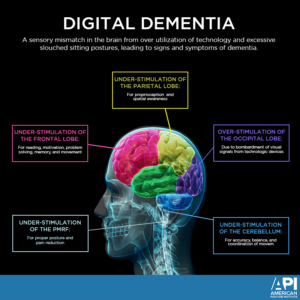Book Treatment Now

Digital Dementia
Digital Dementia refers to memory and cognitive decline due to excessive use of digital technology. Coined by neuroscientist Manfred Spitzer in his 2012 book, the term highlights how our increasing dependence on smartphones, tablets, and other devices impacts brain function, particularly memory and concentration.

The Impact of Technology on Cognitive Abilities
The overuse of mobile devices affects brain development, leading to cognitive imbalance. Heavy reliance on the left brain (associated with logic and reasoning) can result in underdevelopment of the right brain, which is crucial for creativity and emotional processing. This imbalance contributes to digital dementia, with symptoms such as poor memory retention, lack of focus, and reduced problem-solving skills.
Short-Term Memory Decline and Other Consequences
Spitzer explains that “short-term memory pathways will start to deteriorate from under-use if we overuse technology.” This means that tasks requiring memorization and focus become increasingly difficult as technology becomes a substitute for our cognitive efforts.
The negative effects extend beyond memory. Conditions such as ADHD, autism spectrum disorders, anxiety, learning difficulties, and sleep problems have been linked to excessive screen time. The overstimulation caused by technology triggers the same dopamine pathways in the brain as addictive substances like cocaine, opiates, and methamphetamines.
How to Prevent Digital Dementia
To combat digital dementia, it’s important to practice digital detoxes, limit screen time, and engage in activities that stimulate both hemispheres of the brain. Regular physical exercise, mindfulness, and creative hobbies like drawing or music can also help counterbalance the negative effects of technology on brain development.




This concept of Digital Dementia is indeed concerning, and it resonates with many of us who find ourselves increasingly dependent on our devices. The balance between technology use and cognitive health is delicate, and your points about the reliance on the left brain highlight an important aspect of how we engage with information.
Ah, digital dementia—sounds like the title of a futuristic horror movie, doesn’t it? I can just picture it now: people wandering aimlessly in a labyrinth of lost apps, desperately searching for their misplaced grocery lists among layers of social media feeds. In this dystopian saga, the only heroes are those brave enough to unplug and face the great outdoors… perhaps clutching a map made from actual paper.
You’ve touched on a critical issue that many of us might overlook in our daily lives. The concept of Digital Dementia resonates with my own experiences; I sometimes find it challenging to concentrate or recall simple information when I’ll often resort to my smartphone for a quick lookup. It’s fascinating how this reliance can create a cognitive imbalance, as you mentioned.
The concept of Digital Dementia really resonates with me, especially given how deeply entrenched digital devices have become in our daily lives. It’s striking to consider how our reliance on technology not only alters our behavior but also affects our brain’s neural pathways, as Spitzer highlights. I often find myself reaching for my phone to remember things, which speaks to that decline in short-term memory pathways you mentioned. It’s as if I’m outsourcing my memory to my device.
Your insights on Digital Dementia resonate with me deeply. It’s fascinating (and a bit alarming) how our reliance on technology shapes our cognitive patterns. I’ve noticed in my own life that, during moments when I put my phone down and engage in activities like reading or journaling, my creativity has a chance to flourish.
This topic of Digital Dementia raises profound questions about our relationship with technology and its long-term effects on our cognitive health. As someone who regularly witnesses the increasing integration of devices into everyday life, I find the implications of Spitzer’s observations to be particularly compelling. The notion that our brains might be physically altered by the way we engage with technology is both intriguing and unsettling.
This concept of Digital Dementia really resonates with me, particularly as I reflect on my own experiences with technology. It’s fascinating, and somewhat alarming, how our lives have become so intertwined with smartphones and constant connectivity. I often find myself reaching for my phone instinctively when I have a moment of downtime, whether I’m waiting in line or relaxing at home. Yet, I sometimes catch myself struggling to remember why I walked into a room moments after entering. I can certainly relate to Spitzer’s idea about the deterioration of short-term memory pathways.
It’s interesting how quickly those little habits can sneak up on us. Reaching for your phone during downtime has become almost automatic for many people. It’s hard not to, considering how much it offers in terms of distraction and connection.
This discussion on Digital Dementia resonates with many of us navigating the complexities of our digitally saturated lives. The cognitive imbalance you mentioned is particularly concerning, as it underscores a broader issue regarding how we engage with technology.
This post really resonates with my own experiences, especially as I find myself constantly reaching for my phone for quick answers or to fill small moments of downtime. It’s concerning how we often prioritize short, immediate gratifications from our devices over engaging in activities that genuinely stimulate our brains. I’ve noticed that when I spend long periods on my phone, I struggle more with tasks that require deep concentration or memory recall, which makes me wonder about the long-term effects of this habit.
I really resonate with what you’re saying about digital dementia and how our reliance on tech is reshaping our brains. I’ve found myself constantly scrolling through my phone, but it often feels like I’m losing the ability to focus on a book or even to have a deep conversation with friends. It’s like our attention spans are diminishing, piece by piece.
I find the concept of Digital Dementia really fascinating and somewhat alarming. It strikes me how our relationship with technology has evolved so rapidly, especially with the rise of smartphones. I’ve noticed in my own life that I often rely more on my device to remember things, whether it’s setting reminders or storing contacts, rather than exercising my memory. This definitely raises questions about our cognitive habits and whether we are unknowingly outsourcing our memory functions to our devices.
I’ve been thinking about the notion of digital dementia ever since I read about it a while back. It’s fascinating how our brains adapt to technology but, as you pointed out, can suffer from the consequences. I recently noticed that I struggle to remember simple things like names or even where I left my keys, especially when I’m constantly distracted by my phone.
It’s interesting how these little moments reveal a lot about our relationship with technology, isn’t it? The struggle to recall names or remember where we left our keys reflects how our constant engagement with devices can sometimes leave us feeling a bit scatterbrained. It’s like our brains are caught in a cycle of distraction, always ready to jump to the next notification instead of focusing on what’s right in front of us.
I can definitely relate to what you’re saying about digital dementia. It’s interesting how our reliance on technology has changed the way we process information and, ultimately, how we remember things. I’ve caught myself using my phone as a crutch too—like when I have to look up a friend’s name or the title of a song. It used to feel effortless to recall that kind of stuff.
This concept of Digital Dementia raises some important and nuanced questions about our growing dependency on technology and its effects on cognitive functions. I have often noticed how my own interactions with the digital world can lead to both benefits and drawbacks. For example, while the accessibility of information at our fingertips has enriched my knowledge base and allowed for efficient learning, I sometimes find myself struggling to retain that information in the long run. It’s a curious paradox—while technology ostensibly aids memory retention through easy retrieval, it might also discourage the deeper processing that leads to lasting knowledge.
You’ve touched on a really interesting dynamic with the concept of Digital Dementia. I can completely relate to your experience of enjoying the immediate accessibility of information while also grappling with retention. For me, it’s almost like there’s a trade-off occurring. Having a world of knowledge just a click away is undeniably empowering, but it sometimes feels like my brain is getting a workout of convenience rather than a solid exercise in retention.
You’ve captured a fascinating tension that many of us feel. The convenience of having information right at our fingertips is a game changer for sure. It opens up a world of possibilities we couldn’t have imagined a couple of decades ago. But there’s definitely a cost to that convenience, especially when it comes to how we process and retain information.
Your exploration of digital dementia raises crucial points about a topic that is increasingly relevant in our tech-dominated lives. I’ve found myself reflecting on my own relationship with technology and how it has subtly shifted my cognitive habits over the years. The issue you highlight, particularly the decline of short-term memory due to over-reliance on devices, resonates deeply with many of us who rely on our smartphones for everything from reminders to navigation.
It’s interesting how many of us have started to notice those changes in our cognitive habits, isn’t it? I’ve had my own moments of realization when I find myself reaching for my phone instead of trying to remember something or struggling to recall directions I once knew by heart. It does make you wonder about the trade-offs we make for convenience.
Your reflection on the concept of digital dementia is quite thought-provoking, and it’s encouraging to see more people engaging in this conversation. The way technology weaves itself into our daily routines can often feel seamless—too seamless, perhaps. It’s fascinating how our reliance on devices for seemingly simple tasks has impacted our cognitive habits over time. When I think about how often I search for directions instead of committing them to memory or rely on my phone for reminders about appointments, it really drives home the point you made about the decline of short-term memory.
You raise some important points about digital dementia and the implications of our tech dependence. It really is fascinating how seamlessly we’ve integrated devices into our lives, but I sometimes wonder if we’ve traded mental agility for convenience. In the past, navigating with a physical map or jotting down notes in a planner was just part of daily life, and we developed our memory skills out of necessity. It’s like we’ve outsourced those cognitive tasks to our devices, which can be convenient but maybe at a cost to our brain’s natural capabilities.
Your exploration of Digital Dementia raises compelling questions about our relationship with technology. I often find myself reflecting on how much I rely on my devices for even the simplest tasks, like navigating or recalling names. It’s alarming to think that, as Spitzer suggests, this could be reshaping how our brains function, particularly the decline in short-term memory.
You bring up an interesting point about our reliance on devices for simple tasks like navigation and recalling names. It’s becoming increasingly common to feel that our cognitive processes are shifting in response to technology. When I catch myself scrolling through my contacts instead of trying to remember a friend’s name, I can’t help but wonder how this dependence is shaping our brains.
You’ve touched on a really crucial point about our reliance on technology and its impact on our cognitive processes. It’s fascinating—and a bit unnerving—how quickly we’ve adapted to outsourcing so many mental tasks to our devices. Navigating and recalling names are great examples where tech takes the heavy lifting off our brains.
This concept of Digital Dementia resonates deeply with me, especially as I observe the shift in how we, both individually and collectively, approach information and memory in our daily lives. I’ve noticed that whenever I rely heavily on my phone for reminders or quick information, I struggle more with recalling simple facts or names, which I didn’t used to have a problem with. It’s fascinating, yet concerning, how our brains adapt to technology.
Your exploration of digital dementia and its implications on cognitive abilities raises several pertinent points that resonate with my own experiences and concerns regarding our increasingly tech-centric lives. The idea that heavy reliance on our devices can lead to a deterioration of short-term memory pathways is particularly alarming. I’ve noticed, for instance, that many of us, including myself, have started to depend on smartphones for even the simplest tasks, like remembering phone numbers or appointments that we would have once committed to memory. It’s as if we have put our cognitive capabilities on hold in favor of convenience.
You’ve captured a real tension we face today. It’s sobering to think about how quickly we’ve swapped out our mental muscle for the ease of technology. This reliance on devices may seem like an innocuous trade-off for convenience, but it raises an interesting question: what are we compromising in our daily lives?
You’ve captured a real tension we face today. It’s sobering to think about how quickly we’ve swapped out our mental muscle for the ease of technology. I’ve been reflecting on this as I notice how my own attention span has shifted. It’s like I’ve traded the satisfaction of deep thinking for the quick dopamine hits of notifications and instant information.
This exploration of Digital Dementia resonates deeply with my own experiences in today’s technology-driven world. I often find myself reaching for my phone out of habit, and I’ve started noticing how that constant distraction fragments my attention and muddles my ability to concentrate on tasks that once felt effortless. It’s as if our minds are becoming conditioned to expect instant gratification and quick returns, much like the notifications we receive.
It’s really interesting to dive into the implications of Digital Dementia and how intertwined our lives are with technology. I’ve noticed a few changes in my own habits lately that really resonate with what you’re discussing. For instance, I find that I can barely remember any phone numbers anymore—everything is just saved in my contacts. And the other day, I tried to recall a friend’s birthday and realized I hadn’t committed it to memory; I always just look it up on Facebook. It made me think about how reliant we’ve become on these digital tools not just for convenience, but almost as a crutch for our own cognitive faculties.
I can relate to what you’re saying about the impact of technology on our memory. It’s interesting how our reliance on digital tools is reshaping not just what we remember but even how we think about remembering. I used to pride myself on memorizing the birthdays of my close friends, but now I find myself slipping into that same habit of just looking them up. It feels a bit like a trade-off; we gain convenience but at the cost of engaging our memory skills.
It’s true, the way technology shapes our memory and our approaches to it is quite fascinating. With our phones at the ready, it feels like we’re trading in some of that mental effort for a bit of ease. You mentioned memorizing birthdays, which I can relate to deeply. There’s a certain satisfaction that comes from recalling a friend’s special day without relying on a device. But as you pointed out, the convenience of pulling up that information instantly has a way of dulling that satisfaction.
I completely resonate with what you’re saying. It’s interesting how our phones have become both an incredible tool for connection and a subtle barrier to those deeper, more satisfying experiences. I’ve found that when I consciously choose to remember something—like a friend’s birthday or a loved one’s favorite song—I feel a deeper connection to them. There’s a kind of mindfulness that comes with that effort, as if I’m really investing in our relationship.
The concept of Digital Dementia really resonates with me, especially in an age where multitasking often feels like a badge of honor. I’ve noticed how my own ability to concentrate has diminished; I used to immerse myself in a book for hours, but now even a short article feels like a challenge amidst constant notifications. This highlights a broader cultural shift, doesn’t it? Our rapid consumption of bite-sized information could be creating a society that struggles with deeper, reflective thinking.
Your experience sums up a significant shift in our collective relationship with information. The allure of multitasking has turned focus into a fleeting luxury. It’s interesting to consider how our brains, accustomed to quick bursts of content, may actually be rewiring themselves in response to this constant bombardment.
The concept of Digital Dementia you highlight is indeed a poignant reflection on our current relationship with technology. As someone who has experienced the allure of instant gratification that comes with our devices, I can personally attest to the decline in my own attention span and memory when I rely too heavily on them.
Your experience really underscores an important point about how our devices have changed the way we think and interact with the world. It’s fascinating to see how we all grapple with that instant gratification. It’s almost like these devices were designed to make everything accessible with the tap of a finger, but that convenience can sometimes come at a cost.
Your point about devices reshaping our thinking and interactions resonates deeply with me. I’ve often pondered how this immediate access leads us to prioritize instant gratification over deeper experiences or connections. It’s interesting to think about the psychological implications—there’s research suggesting that constant notifications and the need to check our devices can create a sense of anxiety or even lead to diminished attention spans.
I found your exploration of Digital Dementia quite thought-provoking, especially considering how pervasive digital technology has become in our daily lives. The connection between excessive use of devices and our cognitive functions is something that I’ve been reflecting on more and more. Personally, I’ve noticed tendencies in myself, like relying heavily on my smartphone for things I used to remember easily, such as names and appointments. It’s intriguing and slightly concerning how quickly we’ve adopted this dependency.
Your reflections on Digital Dementia really resonate. It’s remarkable how our relationship with technology has evolved, often without us fully realizing it. We’ve reached a point where our devices can take on so many cognitive tasks for us that it’s easy to forget the mental exercises that were once second nature.
This is such an intriguing topic! I’ve definitely noticed a shift in how I process information since I started relying heavily on my phone for everything—from reminders to managing my calendar. Sometimes I struggle to remember even simple tasks without the help of my devices.
This topic really hits home for me, especially as I reflect on my own habits over the past few years. I’ve definitely noticed a shift in how I process information and remember things since I started relying more heavily on my phone for everything—taking notes, using reminders, and even just looking up random bits of information. It seems so harmless, right? But it’s funny because I used to pride myself on having a pretty sharp memory. Now, it feels like I need to double-check the weather or a simple fact on a whim, which kind of makes me wonder if I’m letting these devices do my thinking for me.